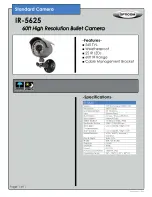
Doc. P/N 8.8517.00.6
Rev. December, 2019
PAGE / 7
1.3.
Clarification of the Temperature Classes
1.3.1.
ATEX
Maximum process
temperature
Gas temperature class
Dust temperature class
Part of the equipment
situated in Category 1
(zone 0/20)
+ 80 °C
+95 °C
+125 °C
T6
T5
T4
T 85 °C
T 100 °C
T 130 °C
Part of the equipment
situated in Category 2
(zone 1/21)
Max ambient temperature
Gas temperature class
Dust temperature class
+ 65 °C
T6
T 85 °C
1.3.2.
IECEx
Part of the equipment
situated in zone 20
Maximum process
temperature
Dust temperature class
+ 80 °C
+95 °C
+125 °C
T 85 °C
T 100 °C
T 135 °C
Part of the equipment
situated in zone 21
Maximum ambient
temperature
Dust temperature class
+ 65 °C
T 85 °C
1.4.
Hazardous Area Information
1.4.1.
Cerex (D) – Explosion Protection Ceramic Pressure Detector ‘Dust’
This detector is suitable for installation in:
Dust Ex areas: installation into zone 21 (and 22) and wetted parts in contact with zone 20.
1.4.2.
Cerex (G/D) – Explosion Protection Ceramic Pressure Detector ‘Gas’
This detector is suitable for installation in:
Dust Ex areas:
installation into zone 21 (and 22) and wetted parts in contact with zone 20
Gas Ex areas:
installation into zone 1 (and 2) and wetted parts in contact with zone 0.
When installed in Gas Ex zones, an Eex(i) intrinsic safe separation barrier shall be used (installed in an non-
hazardous area, typically in Fike EPACO enclosures).
1.4.3.
Conditions for Special Use
For the equipment with a permanently connected cable, the user will have to connect the free extremity of cable
either in a non-explosive atmosphere, or in an enclosure protected by a recognized protection mode adapted to the
area.
Summary of Contents for 2994502201-C-S
Page 18: ......
Page 19: ...Notes ...





































